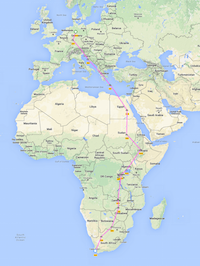Sunday,
25th Oct,
ROXANNES
BIRTHDAY
09h27, 30
Degree
The Taxi
collecting us had his trunk full of spares and only when Dietmar got very firm
with him and told him in very strong language to "REMOVE THE SHIT FROM THE
BOOT to make space for our luggage" we eventually got going, with the
luggage and no spares.
 |
| Into oncoming traffic, no worries |
We got to
the airport at 08:25, again all went
good, we paid landing and parking fee, were told Europe is a rich country and
therefore we had to pay higher fees.
We leave
it at that. We do not want to argue again.
One only
visits Djibouti IF ONE HAS TO.
40
Minutes into the flight, below us nothing but bare terrain in sight.
We are
now in Ethiopian Airspace.
60
Minutes into the flight,
terrain
has not changed, maybe a few bushes, there is a lake, vision is very misty, and
there are jeeptracks now and a village and more villages, very difficult to
make out in those conditions, there is definitely agriculture down there, we
have no idea where the water is coming from, we see no reservois in the
mountaines area, the riverbeds are dry.
Now it
looks like the Valley of thousand Hills, the green lushness is not here, but
from the terrain point of view, settlements, houses and their corrugated iron
roofs glittering in the sun, villages everywhere,
Now
trees, and now forests, and mountains. It looks like a wavy chess board down
there. The roads are still Jeep Tracks, I have yet to see a car or truck.
And now
we see small reservoirs and lakes. And the first tarred road comes into sight.
The
transission from bare terrain to this is fascinating.
We are
approaching Addis Abbaba.
German
Version
Sonntag,
25.Oktober, 09h27, 30 GradC
Roxis
Geburtstag
Das Taxi
welches uns abholt, hat den Kofferraum voll mit Auto Ersatzteile, unser Gepaeck
passt nicht zur Haelfte rein. Da die Kofferraum Haube eh, wegen der vielen
Beulen, nicht zu schliessen ist, sollte zumindest das Gepaeck halbwegs sicher
darin liegen.
Der
Fahrer packte das Zeug/ Ersatzteile dann halbherzig von einer Seite zur
anderen, bis Dietmar ihm dann in sehr starker Sprache sagte wo es langgeht…die
Teile flogen jetzt raus und die Koffer rein.
Am
Flughafen um 08h25 ankommend, lief nochmals alles gut mit den Abwicklungen
usw Auf die Frage warum die
Fluggebuehren, Landegebuehren und Parken acht mal so teuer sind wie in
Europa antwortete man uns, dass in
Europa die Flughaefen das Geld nicht so noetig brauchen und hier in Djibouti
waere das halt nicht so, alles waere aermer aus diesem Grunde waeren die
Gebuehren hier hoeher…
Wir
lassen das jetzt durch, wir wollen nicht schon wieder diskutieren.
Man
besucht Djibouti NUR WENN DU MUSST.
Man
braucht hier nicht hin, zumindest wir nicht.
40
Minuten in den Flug,
wir sehen
nichts ausser karge Landschaft.
Wir
fliegen jetzt in den Ethiopian Luftraum
60
Minuten in den Flug,
Landschaft
hat sich nicht viel geaendert, vielleicht ein paar mehr Buesche, ein Damm, es
ist sehr truebe draussen, jetzt kommen Sandstrassen in den Blick und ein Dorf,
auf einmal mehr Doerfer, schwierig richtig zu sehen aber dort unten ist auf
jeden Fall Landwirtschaft, wir haben keine Idee wo das Wasser zum Bestellen
herkommt, wir sehen keine Wasser Daemme oder Reservoirs in den Bergen und die
Fluss Betten sind trocken.
Diese
Gegend erinnert mich an DAS TAL DER 1000 HUEGEL in KZN Sued Afrika, das gruene
tropische ist nicht hier aber von der Landschaft her, die Kraals und die
Doerfer, die Haeuser mit den Blechdaechern die in der Sonne funkeln und
blitzen. Jetzt Doerfer ueberall.
Baeume,
sogar eine Waldgegend und Berge. Und Landwirtschaft. Es sieht wie ein gewelltes
Schachbrett aus dort unten.
Auf den
Sandstrassen habe ich noch kein Auto oder LKW gesehen.
Jetzt
kommen aber kleine Wasserdaemme in Sicht. Und die erste geteerte Strasse. Die Veraenderung von der kargen Landschaft zu
dieser Landschaft ist fazinierend.
Wir
naehern uns Addis Abbeba.
DJIBOUTI
IN THE COUNTRY CALLED DJIBOUTI
Djibouti is very
diverse, thanks to its strategic geographic location, which has been (and still
is) a crossroad of trade and commerce. The country’s culture is highly
influenced by its ethnic clusters, with the dominant groups being the Afar and
Issa-Somali. The Issa Somali make up 60 percent of the Djibouti population,
though their language is not considered an official tounge. This group is
largely Muslim and about a quarter of its population lives a nomadic lifestyle,
residing in small huts that can easily be packed up and moved on the back of
camels. The Afar people live in the desert and the mountains, and make up 40
percent of the country's population. They are classified into two subgroups,
the Asaemara and Adaemara. Ethnic traditions are very much alive, alongside
European and French influences.












No comments:
Post a Comment